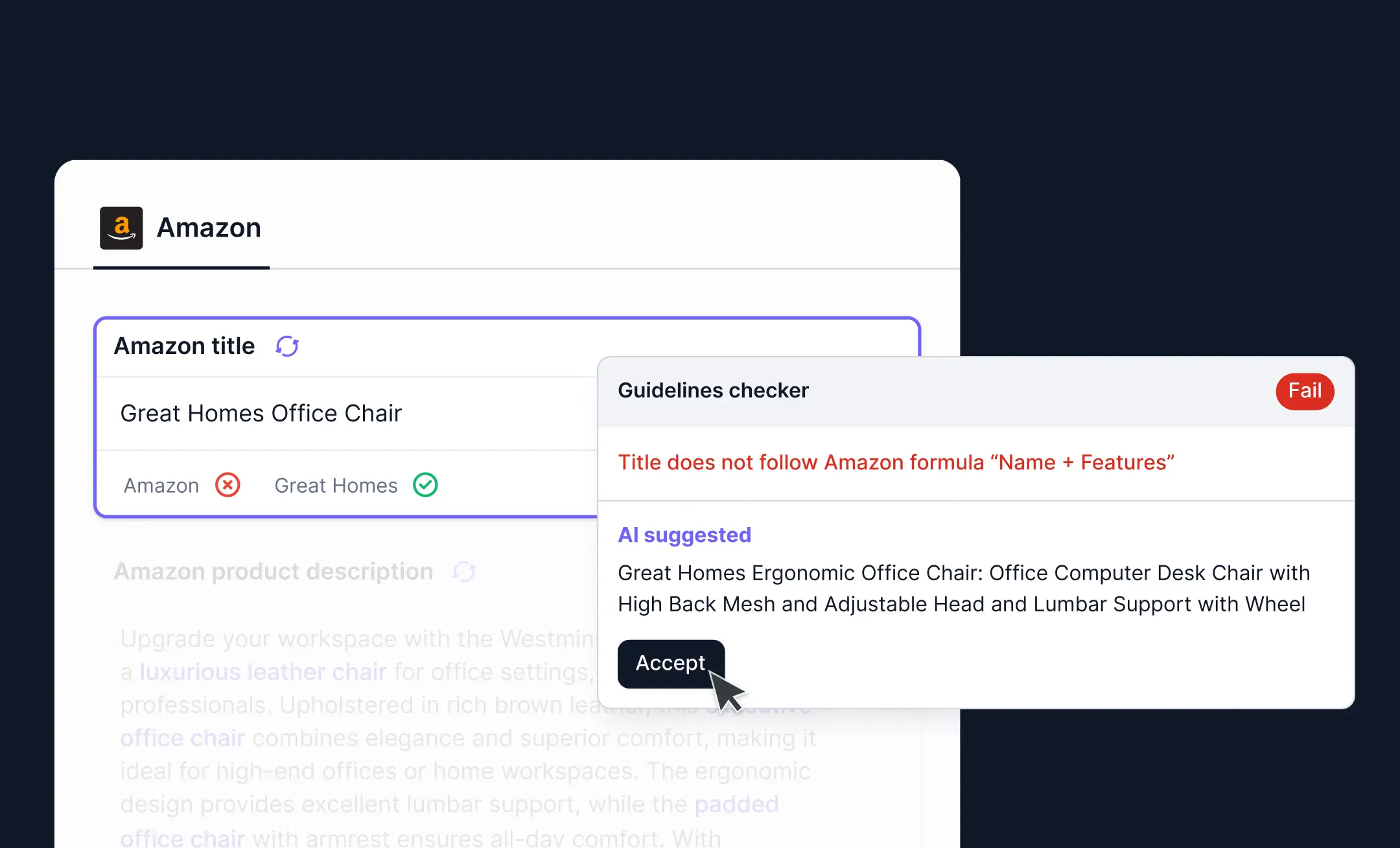Agenti AI per il commercio al dettaglio e l'e-commerce


Gli agenti AI Hypotenuse sono come 5 o addirittura 10 compagni di squadra in più al vostro fianco, ognuno dei quali si occupa di una parte diversa del processo di creazione dei contenuti dei vostri prodotti di e-commerce.
Ogni agente AI è specializzato in un compito specifico. Uno potrebbe essere esperto nella scrittura delle descrizioni dei prodotti, l'altro pulisce i dati, mentre altri si occupano della SEO, dell'editing delle immagini o della revisione dei contenuti.
Lavorano insieme non solo per automatizzare le attività ripetitive, ma anche per supportarvi nel prendere decisioni complesse e agire di conseguenza. È come avere un team potente che vi aiuta a gestire e ottimizzare i contenuti dei vostri prodotti, permettendovi di concentrarvi sulla crescita strategica.
Caratteristiche principali degli agenti AI Hypotenuse
Genera descrizioni con precisione
Esempio:
Supponiamo chestiate lanciando sia abbigliamento casual che formale. L'agente di intelligenza artificiale evidenzierebbe il comfort e l'elasticità per il primo, e la sartorialità e la qualità del tessuto per il secondo, in base a ciò che gli acquirenti probabilmente considerano prioritario.

Rileva e corregge automaticamente le incongruenze.
Esempio:
Seun divano della vostra collezione premium usa l'espressione "crazy soft", l'agente AI potrebbe segnalarlo e suggerire invece "plush feel" o "soft-touch fabric", allineandosi a un tono più raffinato.

Adatta i contenuti ai prodotti e al pubblico
Esempio:
Sevendete anche su Amazon, l'agente AI ristrutturerà il vostro titolo per adattarlo al formato e al limite di caratteri di Amazon. Inoltre, distillerà i vostri punti chiave di vendita in 5 punti sintetici.

Applica sfondi contestuali
Esempio:
Perun vaso di ceramica artigianale, l'agente AI seleziona una superficie neutra con un'illuminazione morbida e naturale. Questo fa risaltare l'aspetto artigianale del vaso, a differenza di uno sfondo bianco, che può appiattirne i dettagli.

Affina la composizione dell'immagine
Esempio:
Peruna lampada alta, l'agente dell'IA potrebbe suggerire una maggiore distanza dalla parte superiore per mantenere l'equilibrio visivo. Nel caso di un paio di auricolari wireless, l'agente AI ingrandisce per enfatizzare la custodia di ricarica e la forma degli auricolari.

Colma le lacune e corregge i dati errati
Esempio:
Sel'attributo del prodotto dice "senza cappuccio" ma l'immagine mostra un cappuccio con coulisse, l'agente AI segnala la mancata corrispondenza e corregge il valore dopo averlo verificato.

Strutturare, etichettare e categorizzare i prodotti
Esempio:
Sele informazioni sul prodotto di un trapano dicono "per impieghi gravosi, corpo in acciaio da 10 mm", l'agente dell'intelligenza artificiale estrae attributi strutturati come la dimensione del mandrino (10 mm), il materiale (acciaio) e il tipo di utilizzo (per impieghi gravosi).

Rileva le tendenze del vostro catalogo
Esempio:
L'agente AI potrebbe segnalare un aumento dell'uso di "modulare" come tag chiave per mobili e soluzioni di archiviazione. Ove opportuno, suggerirà attributi e tag pertinenti per aiutarvi a catturare la domanda di ricerca.

Adatta i contenuti dei prodotti per la ricerca
Esempio:
Seun prodotto non funziona bene nella ricerca, l'agente AI ne esamina il contenuto. Può quindi suggerire di aggiungere gli attributi mancanti o di riformulare il contenuto per migliorare la rilevanza.

Identifica le opportunità di ottimizzazione in modo proattivo
Esempio:
Se"zaino resistente all'acqua" registra un picco nel volume di ricerca, l'agente suggerisce di aggiungere questo termine alle descrizioni dei prodotti pertinenti per migliorare la visibilità.

Domande frequenti
Che cos'è un agente di intelligenza artificiale?
Gli agenti di intelligenza artificiale percepiscono l'ambiente, elaborano informazioni, prendono decisioni e intraprendono azioni per raggiungere obiettivi specifici con un intervento umano minimo. Questi agenti utilizzano sensori o dati in ingresso per raccogliere informazioni, analizzarle con algoritmi sofisticati e determinare la migliore linea d'azione in base ai loro obiettivi.
Quali sono i tipi di agente nell'IA?
- Agenti riflessi semplici: Reagiscono a input specifici utilizzando regole predefinite, ad esempio offrendo automaticamente la spedizione gratuita quando il valore del carrello supera una determinata soglia.
- Agenti riflessivi basati su modelli: Utilizzare modelli interni per adattarsi, come i chatbot che ricordano le preferenze passate dei clienti per fornire raccomandazioni di prodotti più pertinenti.
- Agenti basati su obiettivi: Pianificano azioni per raggiungere obiettivi specifici, come l'ottimizzazione di un catalogo prodotti per massimizzare la visibilità sui motori di ricerca.
- Agenti basati sull'utilità: Bilanciare i compromessi per massimizzare i risultati, come la regolazione dinamica dei prezzi per mantenere la competitività e proteggere i margini.
- Agenti di apprendimento: Migliorano nel tempo, come ad esempio un motore di raccomandazione dei prodotti che impara dalle interazioni con i clienti per suggerire opzioni migliori.
- Sistemi multi-agente: Collaborano per raggiungere gli obiettivi, come il coordinamento dell'inventario tra i vari magazzini per ridurre al minimo i tempi di consegna ed evitare le scorte.
Qual è il miglior agente AI per l'e-commerce?
Se volete accelerare il time-to-market, Hypotenuse AI è il miglior agente AI per l'e-commerce. Arricchisce i dati dei prodotti, genera automaticamente contenuti ottimizzati per la SEO, migliora le immagini dei prodotti in massa e mantiene le inserzioni ottimizzate per la ricerca, il tutto seguendo le linee guida del marchio.
Come scegliere l'agente AI giusto?
Iniziate con la mappatura dei vostri flussi di lavoro. Identificate i maggiori colli di bottiglia, soprattutto quelli che, se snelliti, porterebbero il più alto ROI. Quindi abbinate l'agente giusto a questa esigenza:
Hypotenuse Product Data AI Agent per strutturare i dati dei prodotti, completare gli attributi mancanti ed etichettare o categorizzare i prodotti.
Hypotenuse Product Content AI Agent per generare automaticamente titoli, punti elenco e descrizioni di alta qualità e ottimizzati per la SEO.
L'agente AI per le immagini dei prodottiHypotenuse in grado di migliorare e standardizzare le immagini dei prodotti in massa.
L'agente SEO AIHypotenuse migliora la visibilità di ricerca con l'ottimizzazione continua di contenuti e metadati.
Ogni agente è costruito appositamente per gestire una parte specifica del ciclo di vita dei contenuti del prodotto.
ChatGPT è un agente AI?
ChatGPT ha capacità agenziali per un uso generale: può assistere nella scrittura, nella ricerca e nel ragionamento in un'ampia gamma di attività. Ma se state cercando un agente di intelligenza artificiale appositamente creato per l'e-commerce, Hypotenuse AI è la soluzione migliore. È stato progettato specificamente per gestire i dati dei prodotti, i contenuti, le immagini e la SEO su scala, aiutando i team di e-commerce a lanciare e ottimizzare i prodotti più rapidamente.

















.webp)